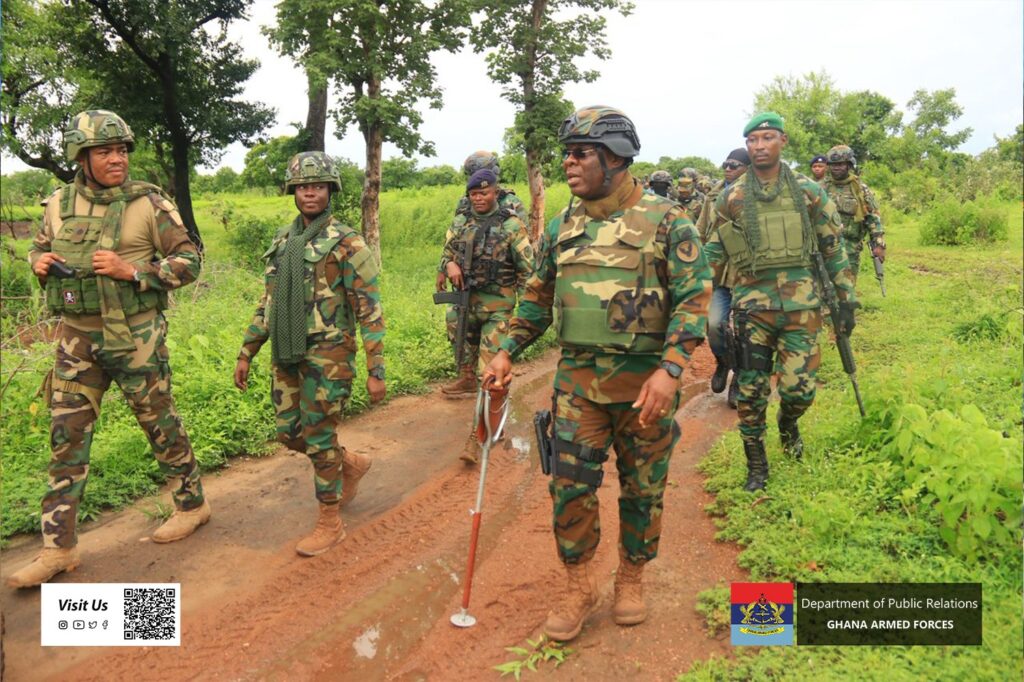Ghana’s military is bolstering its presence in the north, where people are moving south due to the rising threat of terrorist attacks originating in Burkina Faso.
Ghana’s military recently deployed 400 troops to the northern town of Bawku due to bitter, ongoing ethnic violence between the Kusasi and Mamprusi communities. Burkinabe terror groups, including Jama’at Nusrat al-Islam wal-Muslimin, known as JNIM, and those linked to the Islamic State group, have fueled the fighting in recent years by smuggling weapons into the area through illicit networks.
Baffour Agyeman-Duah, a governance expert with the John A. Kufuor Foundation, warned that northern Ghanaian conflicts could provide an opening terrorists seek.
“The traditional conflicts in the north can be infiltrated by these extremists and turn into another war,” Agyeman-Duah told The Africa Report. “If our military is not properly equipped, and if the Bawku problem is not resolved, then we risk creating space for infiltration.”
Although Ghana has not suffered a major terror attack, Burkina Faso-based terrorists used northern Ghana as a logistical base from which to launch attacks into other areas, according to reports. They also use northern Ghana as a medical base to treat injured fighters. Analysts say terror groups also are involved in northern Ghana’s illicit cattle market.
In July, Ghana announced plans to build more forward operating bases in the Upper East and Upper West regions on the Burkina Faso border. Militaries use forward operating bases to support strategic and tactical operations. They often are located closer to the front lines than main bases. Additionally, Ghana’s Air Force announced it’s building a tactical air base in Jogboi, which will support troops operating at the northern border.
“We have extended our military presence a bit north of Tamale,” retired Col. Festus Aboagye, a security consultant, told The Africa Report. “Intelligence personnel have been deployed within the communities, using their natural senses, eyes and ears.”
In early September, the Ghana Armed Forces (GAF) patrolled Bongo and Soe in the Upper East Region to deter terrorist infiltration, monitor civilian activities, and identify possible sleeper cells and terrorist base camps. GAF Brig. Gen. Worlanyo Agbebo urged residents there to monitor and report infiltration by unfamiliar people and suspicious activities. He also asked them to provide accurate information to the military.
Beverly Ochieng, senior analyst at Control Risks, cautions that a military presence alone cannot resolve northern Ghana’s evolving terrorist threat.
“The heavy militarization of the northern region may end up being counterproductive because it fails to address some of the issues that could lead to civil unrest, whether it’s lack of employment opportunities, illegal mining [galamsey] or marginalization,” Ochieng told the magazine.
She added that community engagement is vital and that authorities might consider involving young people and cultural and religious leaders to stem militant activities and infiltration. Such approaches have been successful in Côte d’Ivoire, where local prefects vet incoming refugees and register displaced families to prevent militant infiltration, Ochieng said.
Aboagye agreed that stopping the spread of terrorist groups requires a holistic effort.
“Development is part of the effort,” he told The Africa Report. “If the people don’t have grievances, they are less likely to join terrorist ranks.”
Ghanaian President John Mahama has made regional diplomacy a priority and appointed retired Army officer Larry Gbevlo-Lartey as envoy to the Alliance of Sahel States, the bloc formed by military juntas in Burkina Faso, Mali and Niger.
“Diplomacy is the only way we can go,” Vladimir Antwi-Danso, an international relations scholar, told The Africa Report. “Whether you like the regimes or not, you need to cooperate. Intelligence sharing, military cooperation, support for each other — that is essential.”
In mid-September, Ghanaian and Burkinabe officials met to discuss joint boundary management. Yusif Sulemana, Ghana’s deputy minister of lands and natural resources, said the countries were committed to bolstering stability and prosperity along their shared 583-kilometer border.
Mamoudou Tapily, West Africa regional coordinator with the German Corporation for International Cooperation-African Union Border Program, said preventing conflict and improving governance, social cohesion and economic development is critical in border areas.
“Cross-border cooperation is no longer a mere necessity,” Tapily said in a report by Ghana’s Graphic Online. “It is an essential strategy to face common challenges such as insecurity, climate change and economic underdevelopment. This meeting aims to provide us with the tools to achieve this.”

